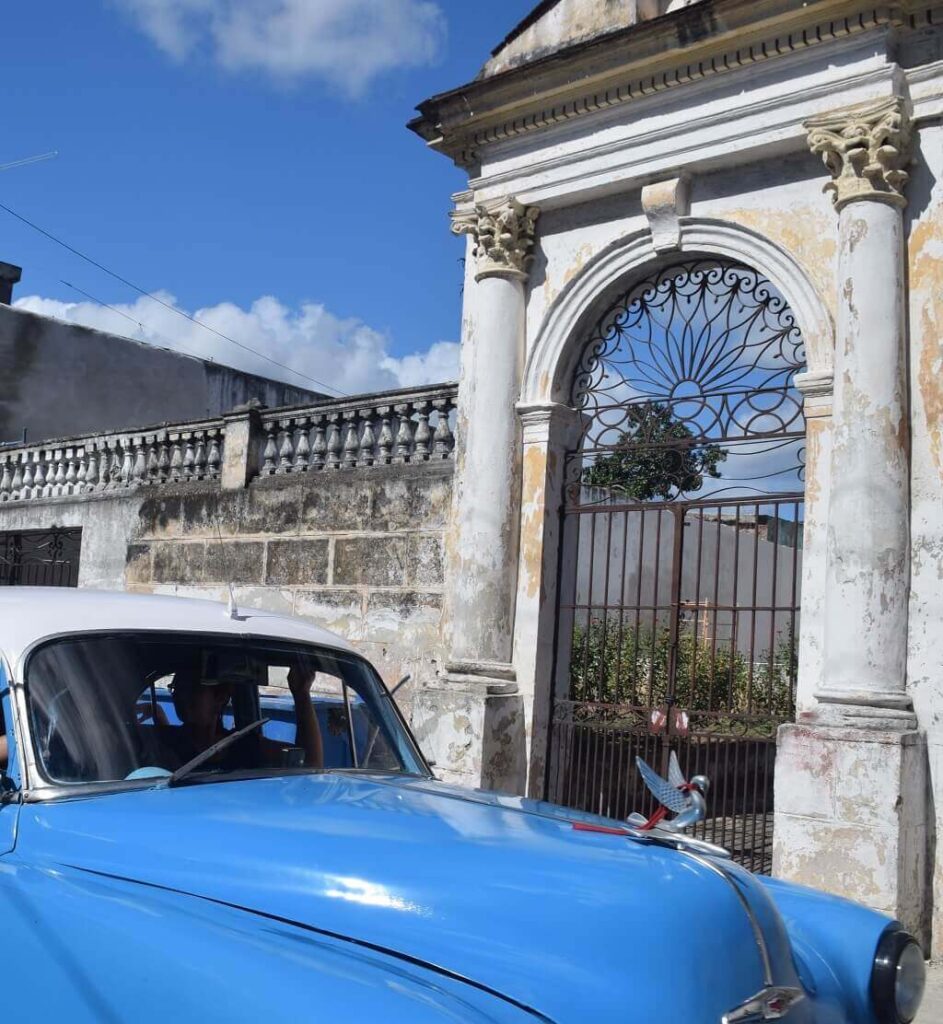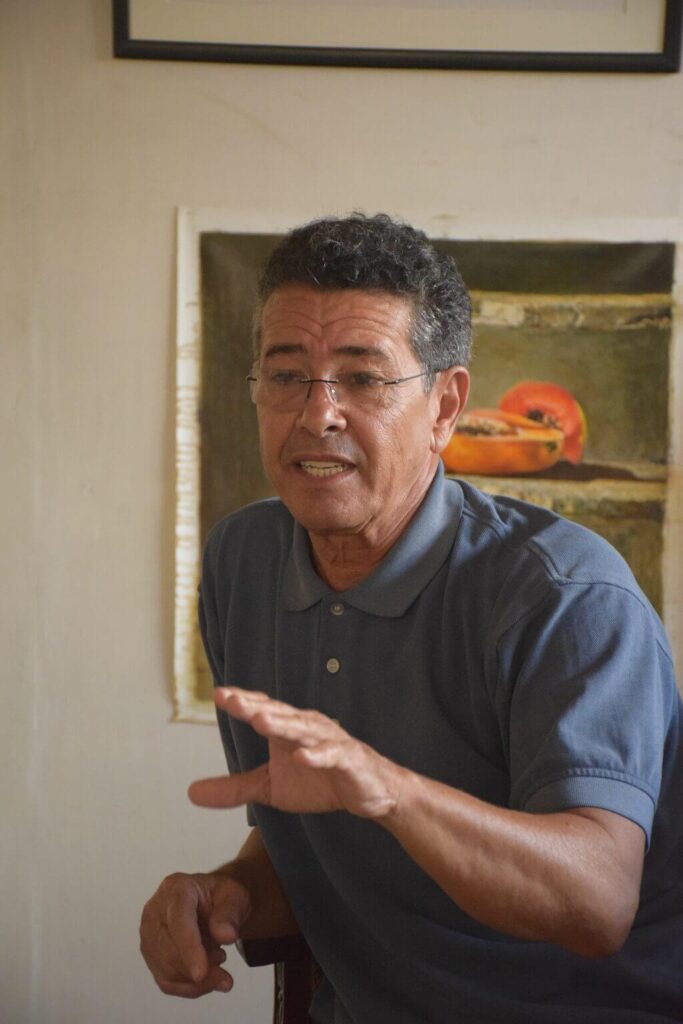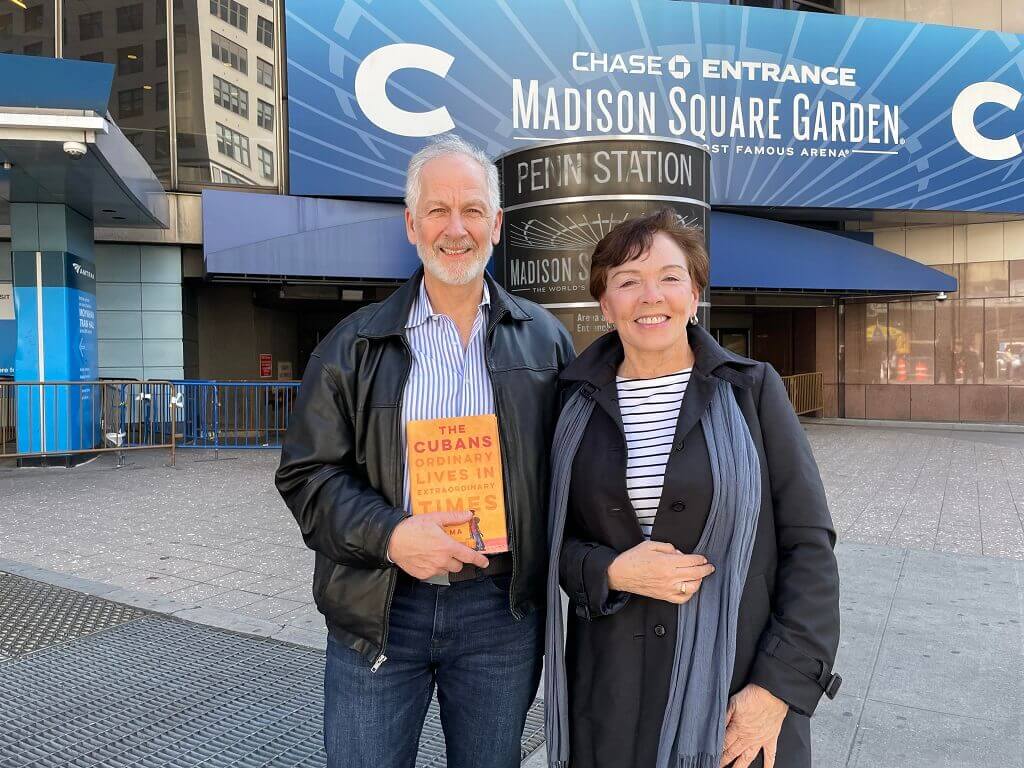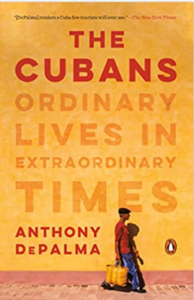You know that parlor game where you ask people what favorite writer they would most like to meet?
I had the opportunity to play that game then I actually met the writer, Anthony DePalma author of “The Cubans: Ordinary Lives in Extraordinary Times,” one of my favorite books. Here is how that came about.
I ordered “The Cubans” as soon as it was published. Being Cuban-American myself, I’ve always been interested in all things Cuban.
The book was extraordinary.
The story follows the lives of several ordinary Cuban families in the little town of Guanabacoa as they struggle to make their way in life within a socialist system that promises a better future yet consistently falls short.

You meet these Cubans…government workers, budding entrepreneurs, an artist and others. They come alive in the pages of the book.
You listen to their perspectives, learn about their struggles and are amazed at their resilience in the face of ongoing material deprivation.
The stories are unvarnished and, unusual today for a book about Cuba, unbiased. Having these Cubans tell their own stories in their own words offers a peek into their daily lives non-Cubans are unlikely to ever see.
I cried at the description of the sinking of the 13 de Marzo ferry and enthusiastically cheered the small victories of people I will never meet. This book engaged me like no other.

The book is simply excellent; meticulously researched, beautifully written, informative and enormously entertaining. You care about what happens to these Cubans.
Even a year after reading the book, I still wonder what became of them. That is the power of a great book.
You don’t have to be Cuban to enjoy this book. You just have to be human.
Below are excerpts from Anthony DePalma’s book, “The Cubans: Ordinary Lives in Extraordinary Times.”
“Después del triunfo,” “after the triumph,” is Cuban shorthand for everything that has happened since Fidel and Raúl Castro grabbed power in 1959.
Everyone knows that Fidel remade Cuba’s political, economic, and social structures, putting the state in charge of and above everything and everyone but him.
During most of Cuba’s six decades of revolution, the real people of Cuba have largely been hidden behind his king-size image.
As Cuba starts to move from the Castro era to whatever comes next, it is changing in many ways—even if the images of old cars and ancient buildings suggest that time is standing still.
Some of Cuba’s leaders have ideas about business and property that are radically different from Fidel’s, but it’s not at all clear whether this represents a desperate attempt to prop up an exhausted revolution, or the genuine beginning of a new nation.
For decades, analysts and correspondents routinely referred to “Fidel Castro’s Cuba,” as if the country he controlled since 1959 belonged entirely to him.
When he died in 2016, state-run media in Cuba proclaimed, “Fidel es Patria,” “Fidel is the fatherland,” while schoolchildren were encouraged to repeat, “I am Fidel.”
If it sometimes seems that all Cubans are, as they say of themselves, un poco loco, a little crazy, it is because they live in an impossible country. They have been on what amounts to war footing for three generations now.
Their government constantly reminds them of the imperialist peril from the north, yet it also demands that the empire drop its embargo so that Cuba can do more business with America and its allies.
The regime has used the perpetual threat of American intervention as cover for every misstep, failed program, food shortage, or power blackout over the last six decades, but it also depends on the billions of American dollars that exiles send back in remittances to keep Cuba afloat.
State-run media presents the United States as a hellhole of drug addiction, mass murder and runaway consumerism, while portraying Cuba as an egalitarian paradise run by a government that can do no wrong.
And yet, when Cubans compare their own lives with what they hear from relatives in Miami or with what they see on the internet, they know it isn’t so.

That would be enough to drive anyone mad, but it accounts for only part of the Cubans’ precarious hold on the reality of their lives.
They have long been cursed by their own greatest strength—their indomitable adaptability and their bottomless capacity to make do.
That’s why the U.S. embargo hasn’t worked, and never will. The idea of making conditions on the island so intolerable that the people will rise up and crush the Castro regime ignores the Cubans’ innate ability to find a way to survive.
People who can turn a plastic soda bottle into a gas tank for a motorcycle, or use an old piston heated in a kitchen stove to repair a flat tire, see the world differently from other more conventional societies.
When adversity is a constant, survival is a process of adjustment. Perhaps living on an island routinely hit by hurricanes has helped them develop this aspect of their national character.
After all, nothing can stop a hurricane or prevent it from doing damage. The only option is to pick up the pieces and figure out how to reuse them.
Unlike Fidel, whose millions of words have been heard, recorded, and replayed ad infinitum, these ordinary Cubans are never heard from.
Their voices have few outlets inside Cuba, and fewer still outside the island. When they speak out, it usually is in small rooms where they hope that the whoosh of a table fan or the tinny sound of an old TV keeps their remarks from prying ears.
Most never get involved in public protests for fear of retribution from a state system of surveillance that they believe watches over their every move.
Only the bravest or most desperate risk everything to join the small number of outspoken dissidents that the government stalks, harasses, and sometimes imprisons.
But it is undoubtedly the complicated silence of their ordinary lives—their personal histories of living with an interminable revolution, their changing priorities and shifting alliances, their triumphs and their tragedies from one moment to the next in an endless stream of warm days under a brilliant sun—that tell the remarkable story of Cuba best.”
After reading “The Cubans” Mr. DePalma became a favorite writer of mine and I sought out his previous works.
Shortly thereafter, I published my own book, “Cuban Exile Memories: Journeys of Courage of Resilience in the Pursuit of Freedom.” Of course, every author wants good reviews extolling the virtues of their work, so I thought of asking Mr. DePalma.
I was under no illusion that someone of Mr. DePalma’s journalistic stature would take the time to read the book of a first-time, no-name author much less write a review.
Anthony DePalma is a 22-year veteran foreign correspondent and reporter for the New York Times. He is the author of several books including “The Man Who Invented Fidel: Herbert L. Matthews of the New York Times and the Creation of Castro’s Cuba.”
He was Bureau Chief for both Mexico and Canada during the NAFTA era and is currently a professor at Colombia University Graduate School of Journalism and the winner of several literary awards.
As I debated asking for a review I remembered my mother’s saying, “try and you might fail, don’t try and you’re guaranteed to fail.”
So I tried and Mr. DePalma gave me a very nice review which I prominently displayed on the back cover of my book along with those of other gracious and talented authors.
Since then, I’ve written several well received posts on books about Cuba and, of course, included “The Cubans.”
On a recent trip to New York City, I contacted Mr. DePalma and asked if he would be kind enough to sign my copy of “The Cubans.”
Not only did he agree, but we also ended up having a nice lunch across from Madison Square Garden. How cool is THAT!
Mr. DePalma even offered to pay for lunch. Of course, I adamantly refused.

It’s fascinating to hear an author talk about what goes into the creation of a book like “The Cubans.”
So how does an Italo-American from New Jersey end up writing a book that delves so deeply into the very essence of Cubanism? He married a Cuban woman, hence the fascination. I guess he’s an honorary Cuban now.
If you are interested in the subject of Cuba, I strongly recommend you read this outstanding book with a truly unique perspective.
You will not be disappointed, and Mr. DePalma may become your favorite writer too.
If you loved “The Cubans: Ordinary People in Extraordinary Times,” you’ll also like these other fine books about Cuba.
Have you ever met a favorite writer, artist or performer whose work inspired you? Tell us about it in the comments.

JOIN MY FACEBOOK GROUP: OVER 50 WOMEN TRAVELERS COMMUNITY.
BTW, if you are getting ready for your trip, make sure to take advantage of these useful, money-saving links to book your trip:
- Research and book your flight with Skyscanner. I have found them to be the best because they list all airlines including the budget ones. You are always sure of having researched all options.
- For car rental around the world, Discover Cars has flexible pickup and drop-off options, I recommend Discover Cars.
- Book your accommodation with Booking.com. I find they have a wide selection and a nice, user-friendly, transparent website.
- Protect your trip and, more importantly, protect yourself with travel insurance. I use Travelinsurance.com and have been very happy with them.
- Looking for a small group tour to unforgettable destinations with top professionals? Intrepid Travel is your choice.
- For more general tours to any destination or attraction, book with Viator. Check them out.
- Need a visa? Get your visa for all countries with Passport Visa Express.
- Looking for a cool walking tour to explore a city? My favorite walking tours are offered by Take Walks.
- Food and drink tours are the best way to enjoy a city. And Devour Tours are my favorite.
- Looking for a good VPN to protect your security, privacy and freedom online while traveling? Nordvpn is your best option.
- The best and most economical way to stay connected while traveling is with an Airalo eSIM.
I personally use, and can recommend, all the companies listed here and elsewhere on my blog. By booking through these sites, the small commission we earn – at no cost to you – helps us maintain this site so we can continue to offer our readers valuable travel tips and advice.






















4 Responses
To tell the truth, I fall in love with reading and I always try to open new interesting books to myself which would amaze me with their original plot. it seems to me that “The Cubans: Ordinary Lives in Extraordinary Times” is my kind of thing which will leave an unforgettable impression after reading. It is so wonderful that you created such a detailed review which helped me understand the concept of this book to a greater extent and delve into this. The story described in the book is really multifaceted and, from my point of view, helps look at Cubans from a different angle, delving into their philosophy and identity. I can say that you need to have a special talent in order to write such a book with such an idea and implement it in an original way. Of course, Anthony DePalma was able to reveal the uniqueness of Cubans and the mechanism of their life in full measure which I admire.
Marina:
Totally agree. The book impressed me immensely. I kept thinking about it long after finishing. So glad you enjoyed the post and thank you for the comment.
Just point out the obvious flaws in this poor book .
“The Cubans is based on many hours of interviews and years of research. But it isn’t exactly journalism, or oral history: it adopts the omniscient third-person narrative voice of a novel, often dipping into the protagonists’ minds. It isn’t always clear whose thoughts and opinions we’re hearing.”
“DePalma’s assumption that regime change would ‘fix’ Cuba is common in the US, but at the end of his book he reveals that he also has personal reasons for thinking this way: he is married to a Cuban exile whose family left in the months after the revolution. As an explanation for the survival of the Cuban model, DePalma’s paradigm – an oppressive regime facing off against a subjugated but passive people – falls short for the same reason most Cold War narratives do: their refusal to concede any legitimacy to the state, or even to analyse it. DePalma asserts without embarrassment that for his account he ‘had no contact with any officials of the government’. He makes no attempt to understand the system as it actually operates.”
Jack:
Thank you for taking the time to write such a thoughtful comment. I understand and respect your opinion although I respectfully disagree.
Thanks for reading. There is no greater complement for a writer than to elicit intelligent, articulate comments such as yours.